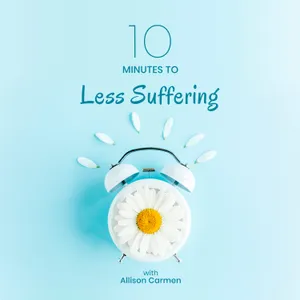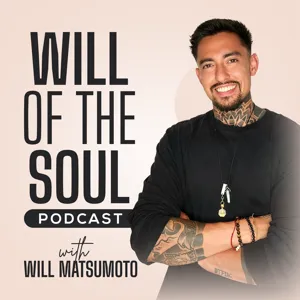Podcast Summary
Learning Effective Strategies for Emotional Regulation: Emotions are an essential part of life and learning to regulate them is crucial. By using effective techniques like James Gross's modal model or Unified Mindfulness, one can work with emotions and avoid being controlled by them. It's crucial to understand that not all emotions are positive or negative and labeling them can be detrimental in the long term.
Emotions are an integral part of our lives and cannot be ignored. Learning to work with them is essential to avoid being controlled by them. Through the Art and Science of Keeping Your Shit Together series, experts reveal effective emotional regulation strategies rooted in both modern science and ancient wisdom. James Gross's modal model provides five simple strategies that can be easily adopted for emotional regulation. Unified Mindfulness is an effective approach to emotional regulation, which is taught by Shinzen Young. Emotions are not always positive or negative, and one needs to be cautious in labeling them as such. Negative emotions can be helpful to motivate us towards positive action, while positive emotions can be a hindrance in the long term.
Understanding and regulating emotions through the modal model.: By paying attention to our emotions, appraising them, and understanding their trajectory, we can skillfully express and experience emotions, avoiding unnecessary suffering. Determining when emotions are helpful or unhelpful is crucial for emotional regulation.
Understanding the modal model of emotions, which involves paying attention to a situation, appraising it, and then experiencing emotional and behavioral responses, can help us better understand and regulate our emotions. This understanding provides a powerful place to stand for thinking about how we can skillfully express and experience our emotions, especially in a world where emotions can cause grave suffering. Having a scientific understanding of emotions allows us to make changes to alter the emotion trajectory and tune our emotions more skillfully. Emotions have both positive and negative sides, and it's essential to determine when they can be helpful, unhelpful, or causing distress.
The science behind emotional fulfillment through mindfulness practice.: Practicing mindfulness can enhance emotional fulfillment and reduce suffering from unpleasant emotions by training focus factors, managing meta emotions, and elevating positive responding.
Mindfulness practice can help us focus on our emotions and improve our emotional fulfillment. By training focus factors like flexible concentration, sensory clarity, and deep equanimity, we can experience pleasant emotions more deeply and reduce suffering from unpleasant emotions. Additionally, practicing mindfulness can help us understand and manage meta emotions - emotions about our emotions - which can often lead to unnecessary suffering. With this practice, we can enjoy greater subjective sense of wellness, positive responding, and retain a lot of agency and activity in the world. Mindfulness science approach to emotions involves investigating how focus factors reduce suffering, elevate fulfillment, and influence our behavior.
The Power of Emotional Training and Contemplative Practice.: By changing our perception of emotions and training our subconscious, we can live a more fulfilling and joyful life, free from unnecessary negativity and reactive triggers.
With training, we can change the way we think about our emotions and view them as helpful rather than harmful. This can reduce negative meta-emotions, allowing us to pursue our goals joyfully and without unnecessary negativity. In a contemplative life, we may notice reactions or triggers that lead to a train of reactivity. By cultivating heightened sensory clarity, equanimity, and flexible concentration, we can train our subconscious to automatically process inner and outer stimuli in a clear and balanced way, leading to a fluid and fulfilling experience of self and the world around us. This training can help us overcome the tendency to react to our experiences with unnecessary commentary and negativity, allowing us to live more fully and joyfully.
The Benefits of Mindfulness Practice for Emotional Regulation and Personal Growth.: Mindfulness practice offers key focus factors that can reduce overwhelm, improve emotional regulation, and offer important strategies for everyday life. These skills are trainable and beneficial for personal growth and flourishing.
Mindfulness practice is a focus training that involves acquiring focus factors and applying them to personal goals. These factors include flexible concentration, equanimity, and sensory clarity, which reduce overwhelm and improve emotional regulation. While intensive meditation training can be powerful, the process model of emotion regulation offers a simple framework for everyday life. By understanding how emotions are generated and applying attention and appraisal strategies, individuals can skillfully experience and adjust their emotions. Acquiring these skills is eminently trainable and broadly applicable to personal flourishing and maturation.
The Five Families of Emotion Regulation Processes: Emotions can be regulated through situation selection, modification, appraisal, and response modulation. The process model provides conceptual tools to manage emotions, allowing people to become more aware and influence them in ways that suit their circumstances.
The process model of emotion regulation sets out five families of emotion regulatory processes, starting with situation selection and ending with response modulation strategies. These provide a toolkit for people to shape their emotions and manage them appropriately. While emotions may not be entirely malleable, this model offers conceptual tools for people to become more aware of their emotions and influence them in ways that suit their circumstances. By paying attention to situations, modifying them, focusing on aspects of them, appraising them, and modulating responses, people can regulate their emotions and adjust or influence their behavior, feelings, and physiology. Thus, the process model offers a headstart in emotion regulation to those without significant training.
Choosing Skillful Ways to Modify Situations: Managing emotions effectively requires an agency mindset towards situations. By reflecting and using situational awareness, we can modify triggering situations in skillful ways that align with our values.
Situation selection and modification are important in managing our emotions. While avoiding triggering situations can seem helpful, it may end up compromising one's life and values. Situation modification offers degrees of freedom to change and adapt to situations. Developing an agency mindset towards emotions allows us to review the toolbox and choose skillful ways of modifying situations that are not helping us. For instance, when we feel angry and stressed during a dinner with a friend due to noisy people in a nearby booth, we can skillfully modify the situation by asking to be moved to another booth instead of letting the anger ruin the dinner. These steps require reflection and situational awareness for successful outcomes.
Emotion Regulation and Mindfulness Training for a Happier Life: Recognize emotions, assess their helpfulness, and learn tools like mindfulness through systematic training with a teacher, community, structured curriculum, and set of techniques for greater inner peace and happiness.
Emotions can be regulated through tools like situation selection and modification, but change may also require the assistance of someone else. It is important to represent the emotion and assess whether it is unhelpful, then explore the toolbox of available techniques. Mindfulness training, particularly a systematic approach, can help individuals become more comfortable with their inner emotional selves. The four components of a systematic approach are a set of techniques, a non-empty set of techniques, a teacher or coach to guide the practice, a supportive community, and a structured curriculum. Such training is particularly useful in modern times and from a scientific perspective.
How Daily Mindfulness Can Change Your Consciousness: Mindfulness exercises, combined with intensive retreats and competent coaching, can improve emotional regulation and help handle a range of emotions. Attention deployment is a valuable tool in mindfulness training to shift attention and modify psychological reality.
Regular daily practice of mindfulness exercises can change the fabric of consciousness by increasing base level clarity, concentration, and equanimity. Along with daily practices, intensive retreats can further enhance the effects of mindfulness training. It is important to have a systematic approach to mindfulness training that includes support from an interactive competent coach. Ordinary individuals living an ordinary modern life can invest in their future by practicing mindfulness. The goal is to improve emotional regulation and handle emotions such as rage, tear grief, shame, interest, joy, love and gratitude with increasing maturity as they age. Attention deployment is a tool to shift attention to modify the psychological reality of the environment and is a part of mindfulness training.
Powerful Tools for Emotion Regulation in Everyday Life: We can train ourselves to regulate our emotions by using basic tools like distraction, cognitive change, and attention deployment. Mindfulness practices are helpful, but not essential for managing our emotions effectively.
We can shift our attention to modify our emotions. Simple steps like distracting ourselves or changing our thoughts can be powerful tools. Mindfulness practices can train us in emotion regulation, but basic tools like situation selection, modification, attention deployment, and cognitive change can be used in everyday life. Cognitive change, or reappraisal, involves changing our thoughts about a situation to trigger a different emotional response. This can be as simple as wondering if someone is okay instead of assuming they are angry. These emotion regulatory processes are powerful resources for managing our emotions and can be used even without access to mindfulness practices or advanced training.
The Power of Believing in the Control and Influence of Emotions: Having a growth mindset towards emotions empowers individuals to engage in activities and manipulate emotions. This fosters a sense of control, leading to a positive spiral of success and improving mental health. Buddhism's message of developing happiness can aid in emotional management.
The belief that emotions can be controlled or influenced to some degree is immensely powerful. People who believe they have agency in shaping their emotions are more likely to engage in different activities and try to change their emotions. This belief puts them on a positive spiral of success and reinforces their sense of self as an agent that has control or influence over their emotions. Therefore, it's essential to have a growth mindset towards emotions rather than feeling helpless and hopeless. The central message of Buddhism is to develop the capacity to be happy and elevate it significantly. These ideas can be helpful in managing emotional responses and maintaining mental and physical health.
The Intersection of Buddhism and Psychology: Understanding Emotions for Greater Wellbeing: By using the process model and recognizing the uniqueness of our emotional landscape, we can navigate emotions gently and skillfully for ourselves and others. A combination of contemplative traditions and psychology can enhance our emotional wellbeing.
Buddha's four noble truths provide insights into suffering and paths towards enhancing wellbeing. The three poisons of attachment, aversion, and illusion can be well described through psychological science, which can help us navigate emotional unfoldings. The process model provides a simple conceptual framework for individuals to understand how emotions can be influenced and modified. The deep rich traditions of Buddhism and contemporary affective science unite behind the idea that we have remarkable capacities to transcend or modify aspects of our suffering. It's crucial to recognize that each person's emotional landscape differs, and our challenges, affordances, and tools for navigating emotions are unique to us. Humility and curiosity about others' experiences can help us gently and skillfully navigate emotions not just for ourselves but also for others.
The Power of Mindfulness in Handling Life Challenges: Mindfulness training can be easily accessed for free online and can provide valuable tools for dealing with life challenges while refraining from judgement and anger towards others.
Being non-judgemental and refraining from anger or disappointment towards others is important. Mindfulness training is easily accessible on the internet for free and can help during life challenges. Regardless of how one sets up their life, sooner or later, difficult situations arise which require radical re-engineering to flourish. It is good to know that there are fully contemporary and free approaches to this heritage of contemplative practice from both the east and the west which can help one deal with such situations. Therefore, systematic training and mindfulness practice can be valuable tools to deal with life challenges and help one make necessary behavior changes.



